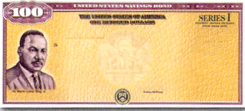
U.S. Savings Bonds are a safe, easy way to save money and a solid addition to your investment portfolio. Over 55 million people are taking advantage of Savings Bonds' competitive rates. Whether you select Treasury's new I Bond or the Series EE Bond, your money is guaranteed to grow and remain safe into the future.
Getting What You Want Out of Life Doesn't Have to Mean Putting Your Hard-Earned Money at Risk.
Using Savings Bonds to pay for qualified higher education expenses may allow you to exclude your earnings from federal taxes.
Great Reasons to Think About Saving Money with U.S. Savings Bonds.
Competitive - U.S. Savings Bonds earn competitive rates of return compared to other forms of saving. Interest on Savings Bonds accrues monthly and compounds semiannually.
Safe - Savings Bonds are backed by the full faith and credit of the United States. Your Savings Bonds are registered, so the Treasury can replace them if they're lost, mutilated, or stolen.
Affordable - For as little as $25, you can start saving money with U.S. Savings Bonds. From there, you can purchase as much as $15,000 worth of Series EE Bonds and $30,000 of I Bonds each year.
Convenient - Buy Savings Bonds where you work, bank, online, or with the EasySaver Plan.
Accessible - Savings Bonds are easily redeemable, so if you need your money unexpectedly, it's right there for you. The longer you let your bonds grow, the more you benefit, yet you can redeem them any time after 12 months.*
Tax Benefits - The interest earned on Savings Bonds is exempt from all state and local income taxes. Federal income taxes are deferred until the bonds reach final maturity, or you redeem them, whichever is first. If you qualify, using Savings Bonds to pay for qualified higher education expenses may allow you to exclude your earning from federal income taxes as well.
How $100/Month in Savings Bonds Can Grow

After 5 years ($6,630)
After 15 Years ($24,609)
After 30 Years ($69,405)
The values are based on 4% per annum, compounded semiannually.
Actual rates vary. Listed monthly savings is an example.
* If redeemed before 5 years, there is a 3-month loss of interest.
I Bonds Details
- Sold at face value. (You pay $50 for a $50 bond.)
- Offer a real rate of return over and above inflation.
- Buy as much as $30,000 per year.
- New rates announced each May 1st and November 1st. This inflation adjustment ensures that your savings earn money over and above inflation.
- Earn interest for up to 30 years.
- Can be redeemed anytime after 12 months.
- Exempt from state and local income taxes.
- Backed by the full faith and credit of the United States.
- Available in TreasuryDirect in any amount between $25 and $30,000. Also available in paper form in the following denominations: $50 $75 $100 $200 $500 $1,000 $5,000 $10,000

Series EE Bonds Details
- Sold at half their face value. (You pay $25 for a $50 bond.)
- Earn rates based on five-year Treasury securities.
- Buy as much as $15,000 per year.
- New rates announced each May 1st and November 1st. This rate adjustment
ensures that your savings always tracks the Treasury bond market. - Earn interest for up to 30 years. You can delay the tax consequences by exchanging them for Series HH Savings Bonds for up to 20 more years.
- Can be redeemed anytime after 12 months.
- Exempt from state and local income taxes.
- Backed by the full faith and credit of the United States.
- Available in the following denominations: $50 $75 $100 $200 $500 $1,000 $5,000 $10,000

 Print
Print Email
Email







